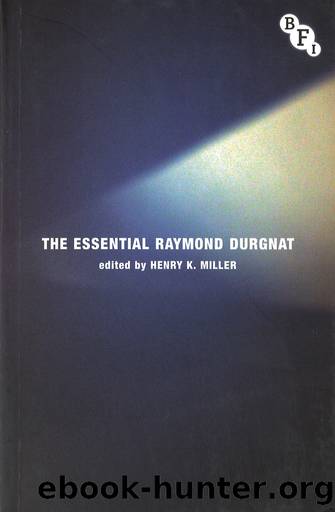The Essential Raymond Durgnat by Henry K. Miller

Author:Henry K. Miller
Language: eng
Format: epub
Publisher: Bloomsbury Publishing
Published: 2014-11-15T00:00:00+00:00
âItâs not like thatâ: The Knack (1965)
The interesting and, in a sense, solitary figure of John Boorman is best related perhaps to Schlesinger, for his two features, Catch Us If You Can (1965) and Point Blank (Hollywood, 1967) are both criticisms of cultural emptiness, set in very expensive, and very different, cultures.
In the English film, Dave Clark plays a stuntman who, with the âButcha Girlâ (Barbara Ferris), flees the cynical world of London ad. agencies. Their mini-odyssey takes them to the beatniks (scattered by army manoeuvres) and a middle-aged couple (Robin Bailey, Yootha Joyce) who have taken refuge in camp nostalgia (for old songs, gramophones, dresses, etc.). The police, hot on the trail of the contract-breakers (i.e. in cahoots with Mammon), burst in on them during a fancy dress ball (the police drive our couple back into reality, the confusions of the âcampâ ball enable them to stay free). Eventually, Steve meets his childhood hero, a Western star now running a ranch as a simple money-spinning proposition. The couple find their offshore island. But, morning and low tide reveal thereâs no escape â the Mephistophelean ad. agency boss just walked in across the sands.
This little philosophical tale recalls Walshâs Glory Alley, Prévertâs Quai des Brumes, Reinertâs Quai de Grenelle and Borzageâs Moonrise in its justification of eccentrics, outsiders and misfits against the social mainstream (even if the beatnik guruâs anecdote about cutting a cat in half could seem a concession to the common mass media implication that nonconformity always ends in violence). Lively in its use of space, thoughtful and extremely sympathetic, the film, like Philip Leacockâs Reach For Glory, seems slightly to muffle its disgust and its tenderness, to move, a little too cautiously, between overtones of the two. Or, if one compares it to Borzageâs delicate little lyric, the magic isnât there.
In Hollywood, however, Boorman fulfils the earlier filmâs promise. Point Blank begins where Catch Us If You Can left off. The hero, long convinced that money dominates everything, makes his way back into society to get more of it. Another odyssey (Kill Me If You Can!), it follows the progress of gangster Lee Marvin as he menaces one member of the organisation after another, for no reason other than greed. And he actually kills none, since an assassination-prone society does his job for him as regularly as fate fulfils Archibaldoâs murderous whims in Buñuelâs film. This glossy, cold-blooded and satisfyingly nasty tale turns its acreage of sumptuous apartments into a murderous Marienbad, a world whose picture windows create envious lookers-in and blind lookers-out, and where the nearest one can get to generous emotions are not hurting the girl who hits one, merely overpowering her, and realising, but only after success, the futility of greed.
Another expert juggler with space is Ken Russell, celebrated for his cultural TV documentaries on Debussy, Elgar, Isadora Duncan, et al. His charming, early short films are less avant- than arriere-garde, for watching Knights On Bikes (1956), The Peepshow (1956), Amelia and the Angel
Download
This site does not store any files on its server. We only index and link to content provided by other sites. Please contact the content providers to delete copyright contents if any and email us, we'll remove relevant links or contents immediately.
| Anthropology | Archaeology |
| Philosophy | Politics & Government |
| Social Sciences | Sociology |
| Women's Studies |
Cecilia; Or, Memoirs of an Heiress — Volume 1 by Fanny Burney(32558)
The Great Music City by Andrea Baker(32020)
Cecilia; Or, Memoirs of an Heiress — Volume 2 by Fanny Burney(31956)
Cecilia; Or, Memoirs of an Heiress — Volume 3 by Fanny Burney(31942)
We're Going to Need More Wine by Gabrielle Union(19049)
All the Missing Girls by Megan Miranda(16032)
Pimp by Iceberg Slim(14509)
For the Love of Europe by Rick Steves(14124)
Bombshells: Glamour Girls of a Lifetime by Sullivan Steve(14077)
Talking to Strangers by Malcolm Gladwell(13371)
Norse Mythology by Gaiman Neil(13370)
Fifty Shades Freed by E L James(13243)
Mindhunter: Inside the FBI's Elite Serial Crime Unit by John E. Douglas & Mark Olshaker(9344)
Crazy Rich Asians by Kevin Kwan(9293)
The Lost Art of Listening by Michael P. Nichols(7506)
Enlightenment Now: The Case for Reason, Science, Humanism, and Progress by Steven Pinker(7314)
The Four Agreements by Don Miguel Ruiz(6765)
Bad Blood by John Carreyrou(6623)
Weapons of Math Destruction by Cathy O'Neil(6281)
